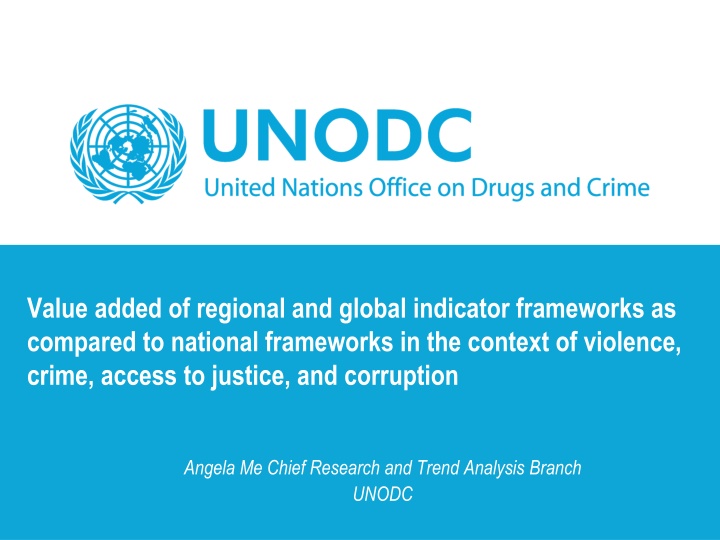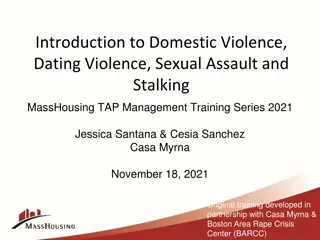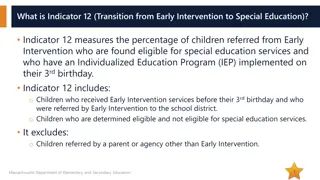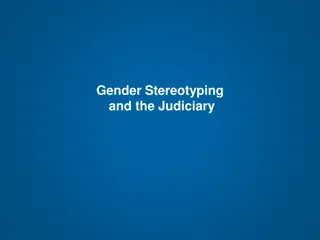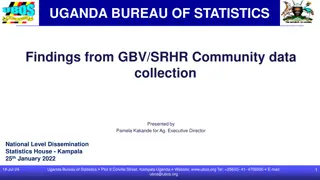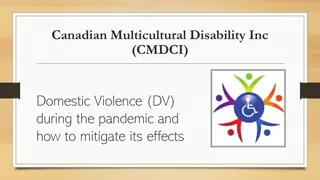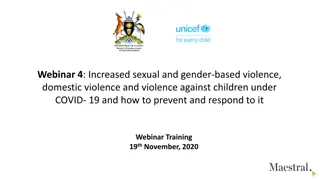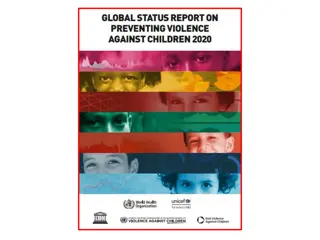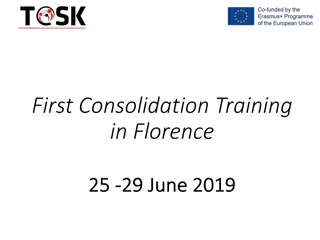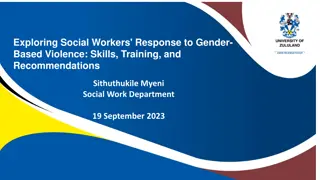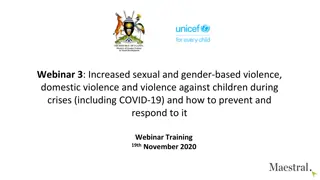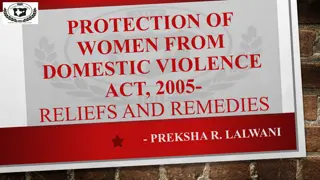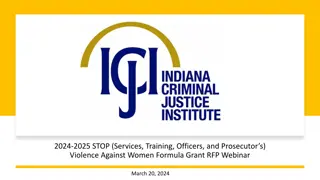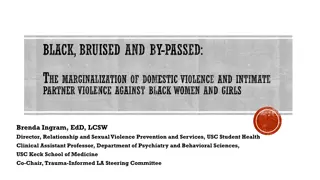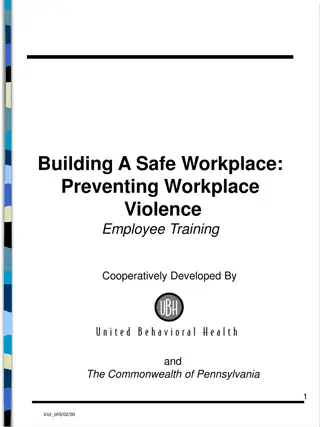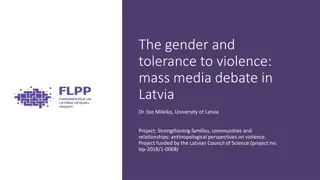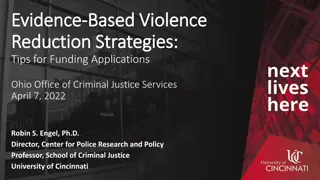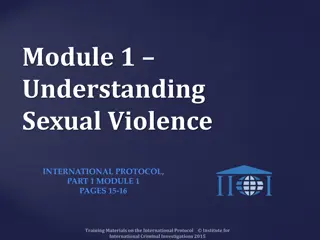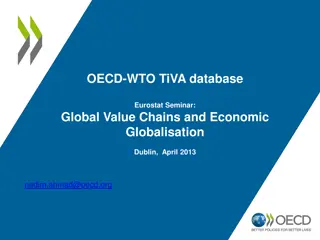Value Added of Global Indicator Frameworks for Addressing Violence and Corruption
Regional and global indicator frameworks play a critical role in addressing issues such as violence, crime, access to justice, and corruption, with a focus on areas like human trafficking, wildlife trafficking, and illicit financial flows. While global monitoring helps aggregate national data for comparison, more emphasis is needed on specific challenges to effectively measure progress.
Download Presentation

Please find below an Image/Link to download the presentation.
The content on the website is provided AS IS for your information and personal use only. It may not be sold, licensed, or shared on other websites without obtaining consent from the author.If you encounter any issues during the download, it is possible that the publisher has removed the file from their server.
You are allowed to download the files provided on this website for personal or commercial use, subject to the condition that they are used lawfully. All files are the property of their respective owners.
The content on the website is provided AS IS for your information and personal use only. It may not be sold, licensed, or shared on other websites without obtaining consent from the author.
E N D
Presentation Transcript
Value added of regional and global indicator frameworks as compared to national frameworks in the context of violence, crime, access to justice, and corruption Angela Me Chief Research and Trend Analysis Branch UNODC
SDG targets 5.2, 8.7 16.3 end trafficking in persons 5.2 eliminate all forms of violence against all women and girls 11.7 provide universal access to safe, inclusive and accessible, green and public spaces 15.7 to end poaching and trafficking of protected species of flora and fauna and address both demand and supply of illegal wildlife products 16.1 reduce all forms of violence and related death rates 16.2 end abuse, exploitation, trafficking and all forms of violence against children 16.3 promote rule of law and ensure access to justice 16.4 reduce illicit financial and arms flows, strengthen the recovery and return of stolen assets and combat all forms of organized crime 16.5 substantially reduce corruption
to trigger national actions National indicators Any value at national level? to trigger regional actions Regional indicators Any value at national level? to trigger global actions Global indicators
Global homicide rate is between 4.6 and 6.8 per 100,000 people
Global monitoring as aggregation of national data Useful if data can be compared across countries Requirements: comparability, quality, coverage Role of global monitoring is ONLY to add up national data ensuring that they are comparable comparable and of good quality good quality
This is true for violence, access to justice, corruption, phenomena that evolves at national level But more is needed for issues such as But more is needed for issues such as trafficking in persons, trafficking of trafficking in persons, trafficking of firearms, wildlife trafficking, and illicit firearms, wildlife trafficking, and illicit financial flows financial flows
Difficult to measure because they relate to hidden phenomena Transnational nature of the problem The problem evolves in different geographical areas The problem can not be understood in national isolation
In order to be properly understood, these problems require a global analysis, beyond just a collation of national data
Transnational dimension of the problem Illicit Supply Licit/illicit Demand Trafficking Source Transit Destination Differently from licit trade statistics, each country can describe only partially one of the three elements. What is not measured is not a statistical omission but it is part of the problem.
Transnational crime Detected in country H Detected in country X Detected in country Z Detected in country A Detected in country D Hidden problem Detected in country A Detected in country W Detected in country Q Detected in country K Detected in country J Detected in country S
Measuring the cloud Connect the dots to describe everything that comes to surface (examples: wildlife, illicit financial flows, trafficking in persons) Helps to partially overcome data gaps Define statistical methodology to describe the hidden part (trafficking in persons)
Supply Estimated populations CITES Trade Database Triangulated model Demand Internet sales surveillance Price data Consumer surveys CITES Trade Database Legal use data Trafficking World WISE
National statistics can be improved with data from other countries and can help national authorities to address the problem 2500 2105 2000 1590 Seizures in World WISE 1500 1000 717 419 500 91 4 0 Kenya Nigeria South Africa Number of seizures made Number of seizures where named as source
Main destinations of transregional flows and their significant origins, 2012-2014 16 % of all victims detected in Western and Southern Europe are from Sub Saharan Africa, especially West Africa
In some cases national statistics can not be compiled without information from other countries: IFF
Gross profit as a share of GDP (percentages) in the Balkan route countries/territory, 2009-2012 average
Innovative ways to estimate the hidden number of human trafficking victims Multiple Systems Estimate (MSE) Based on at least 2-3 lists of detected and recorded victims Kind of capture/recapture methodology In the pilot phase: in the Netherlands ten times more victims than those recorded Network-scale approach Population-based surveys More suited for origin countries In the design phase
Conclusions Need for regional and global data exchange From national data to regional and global analysis The role of NSOs: Ensure quality Coordinate different data providers (police, ministries of justice, NGO (TiP victims), boarder control agencies) Test new survey and other estimation methodods
Thank you for your attention
